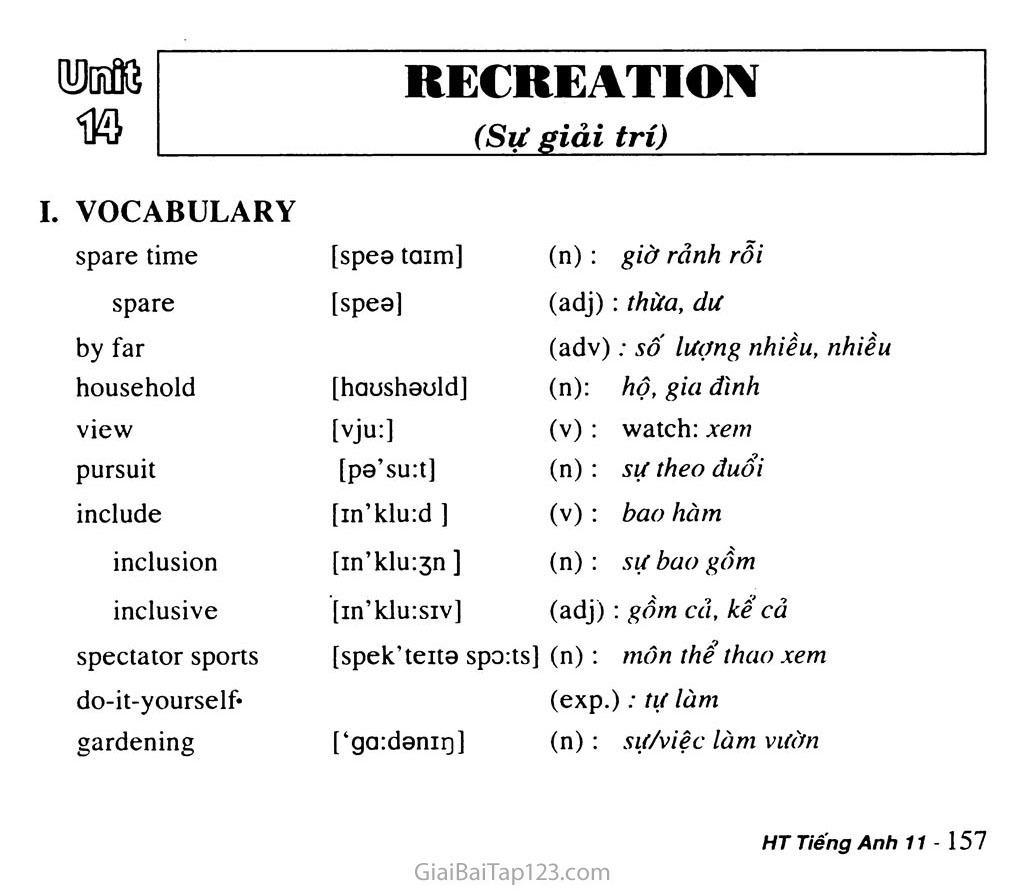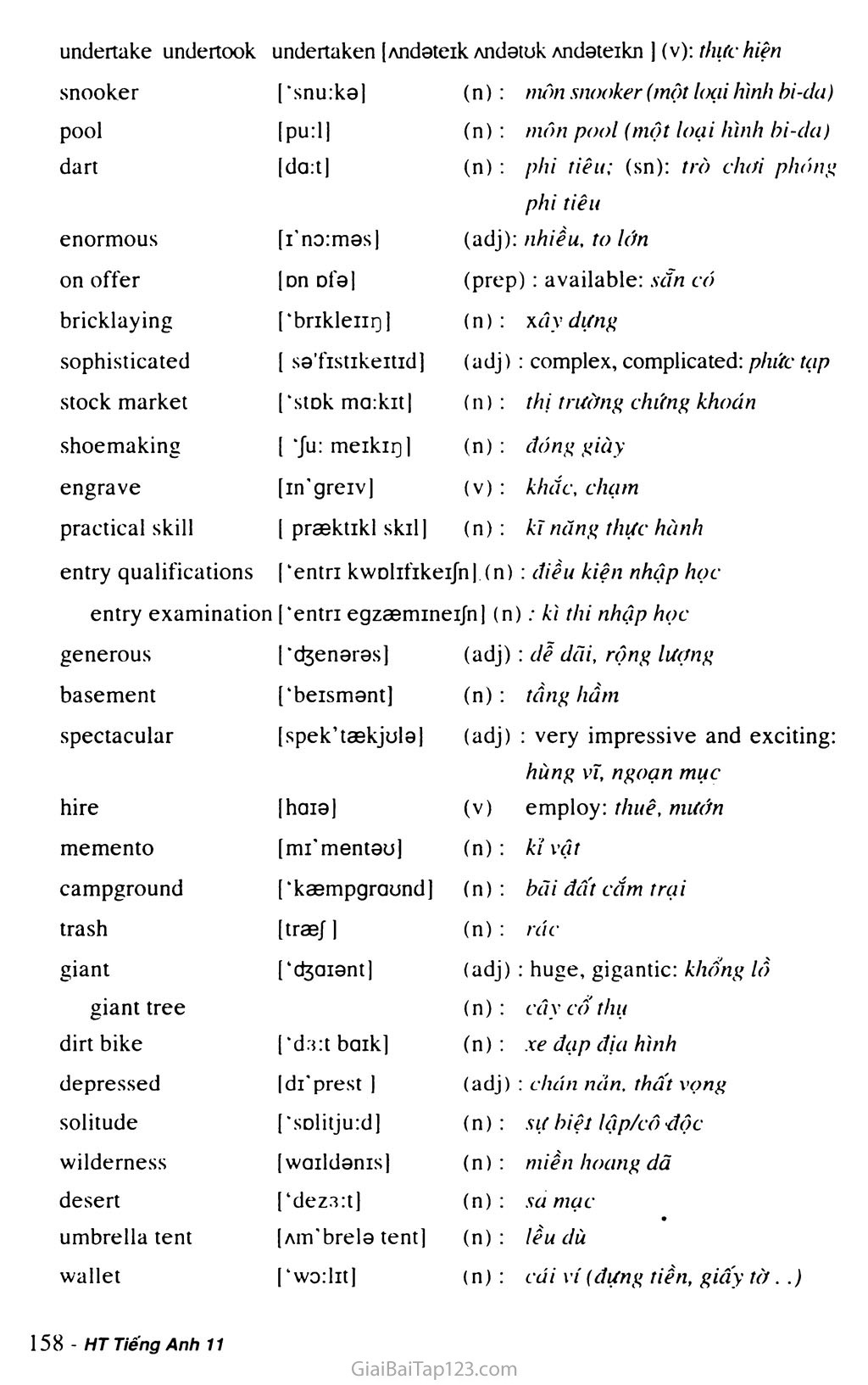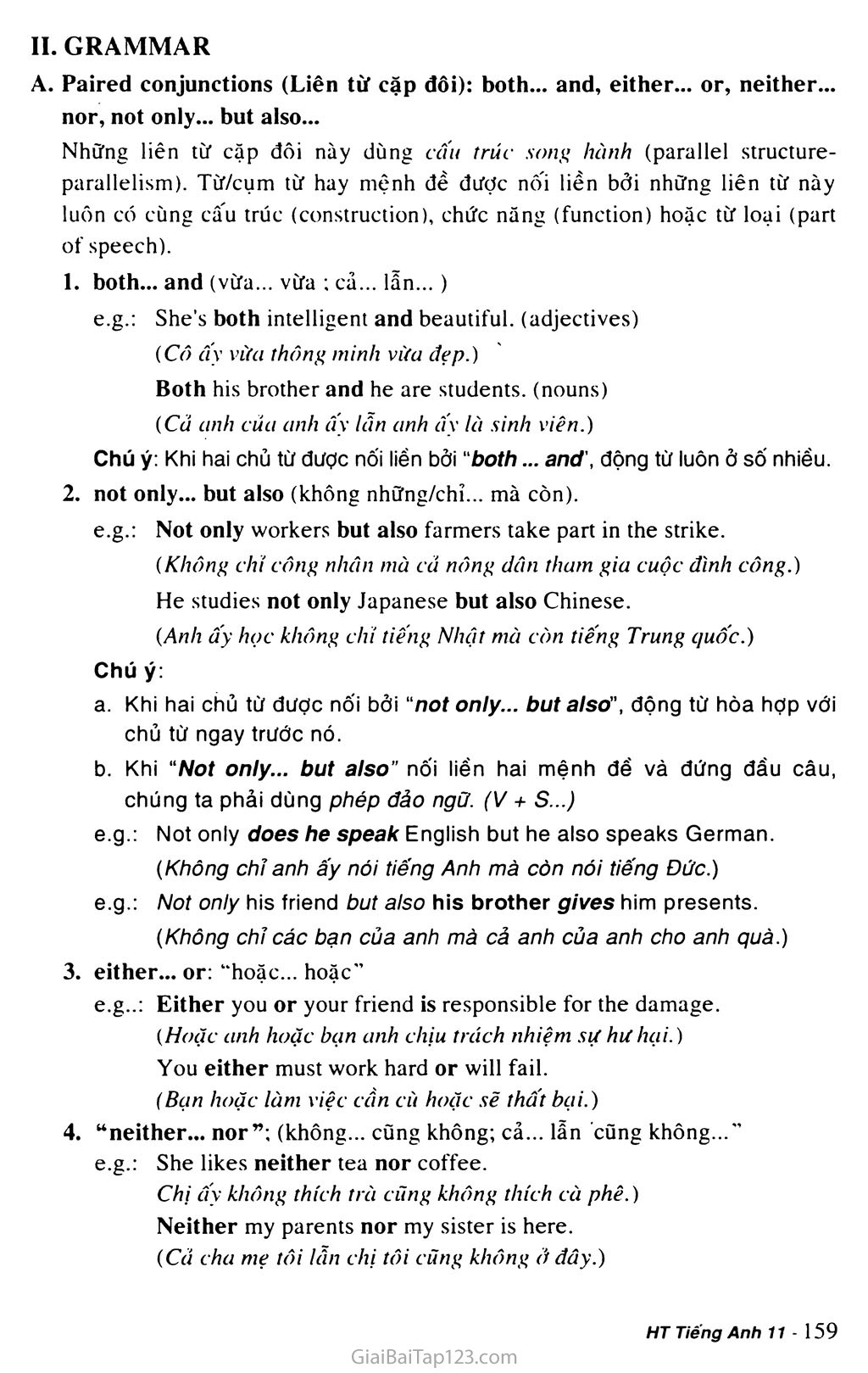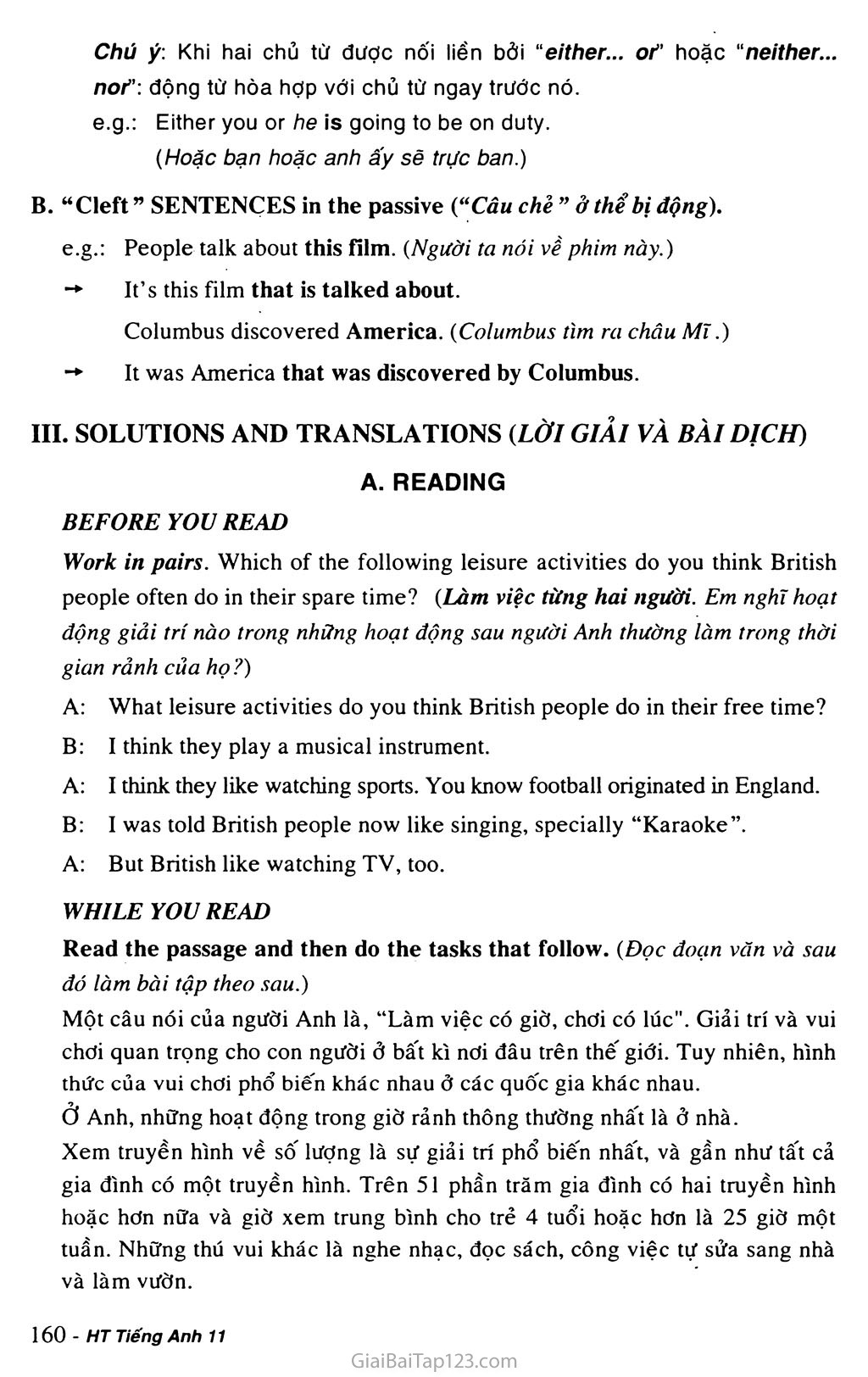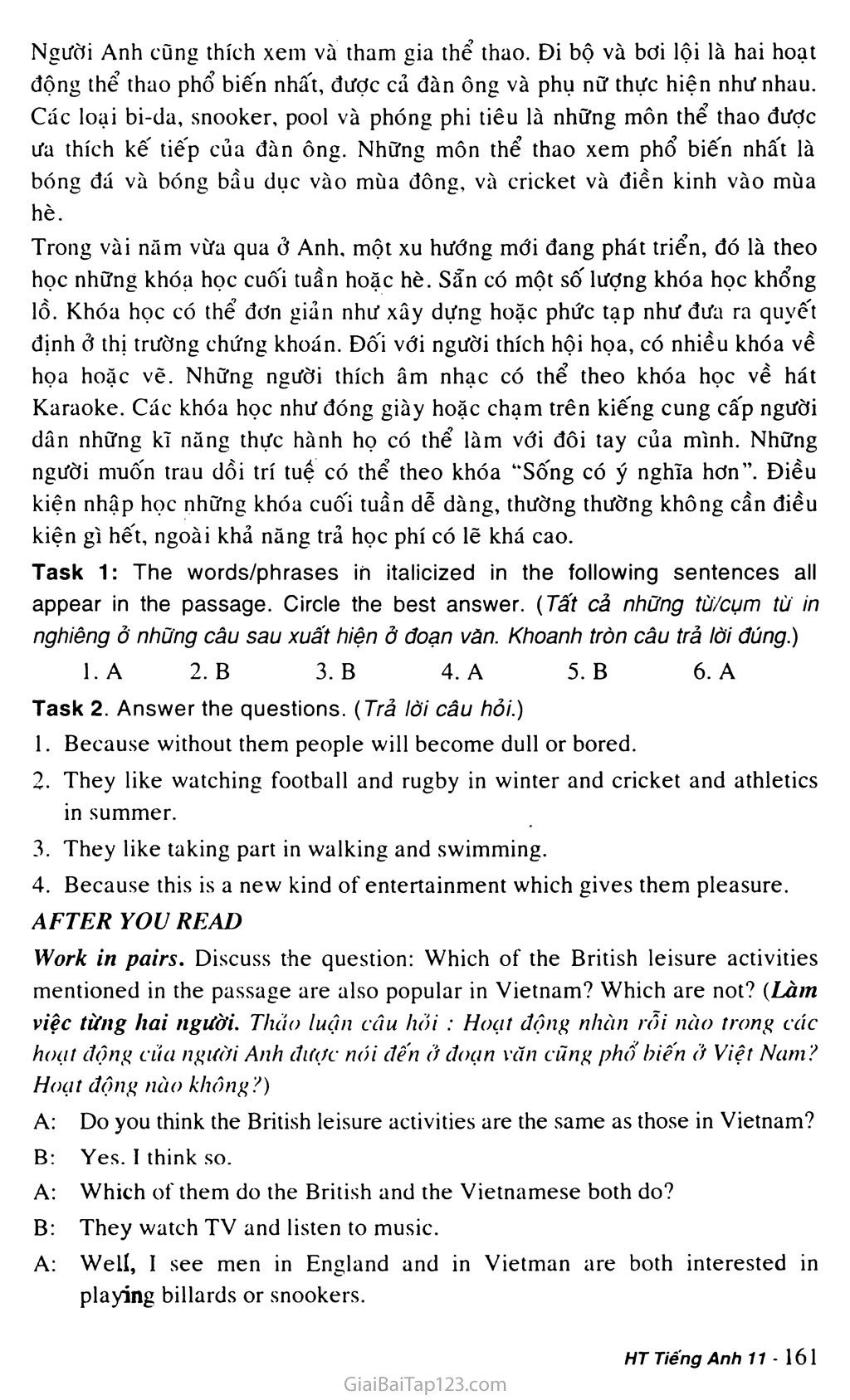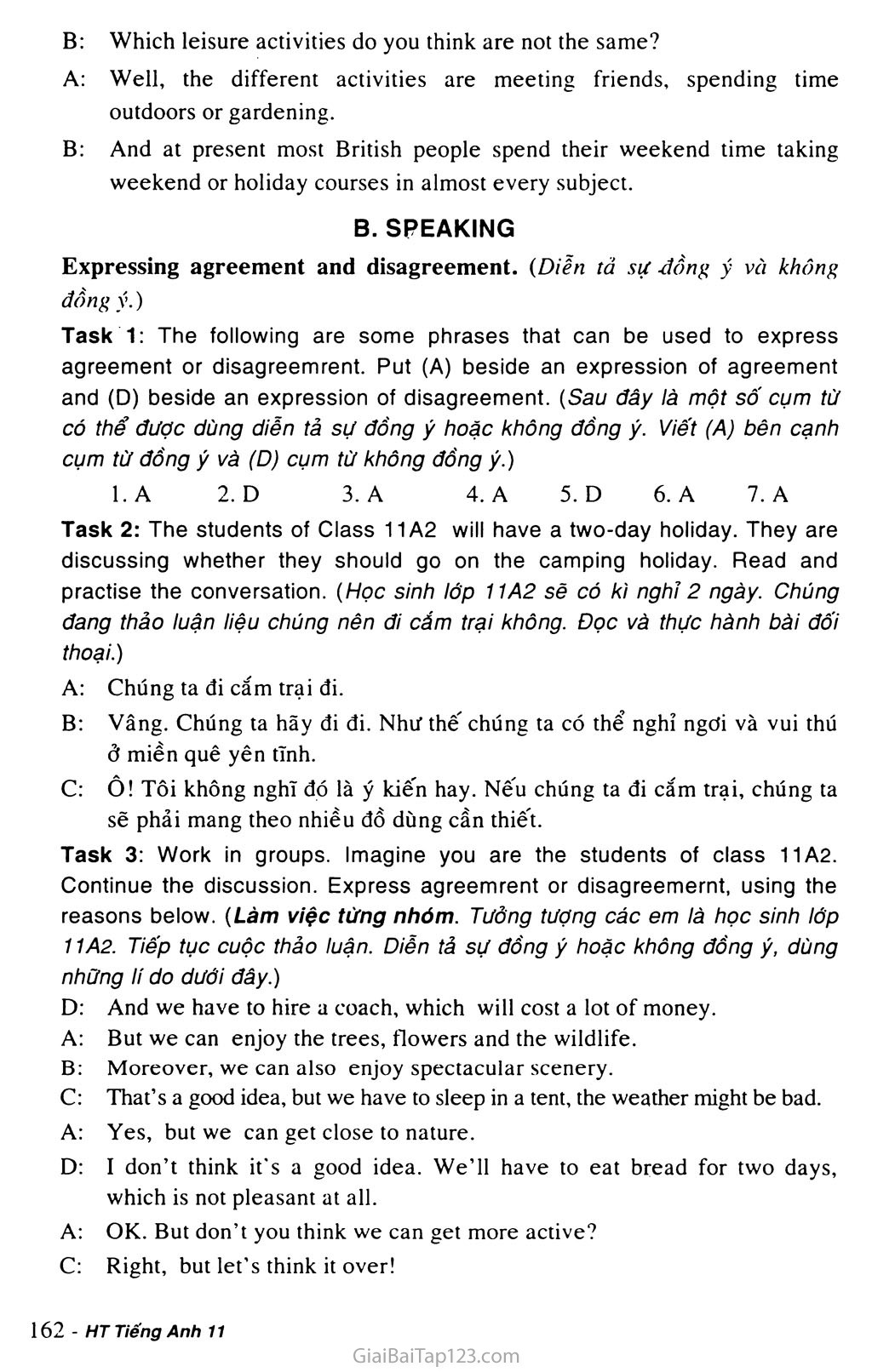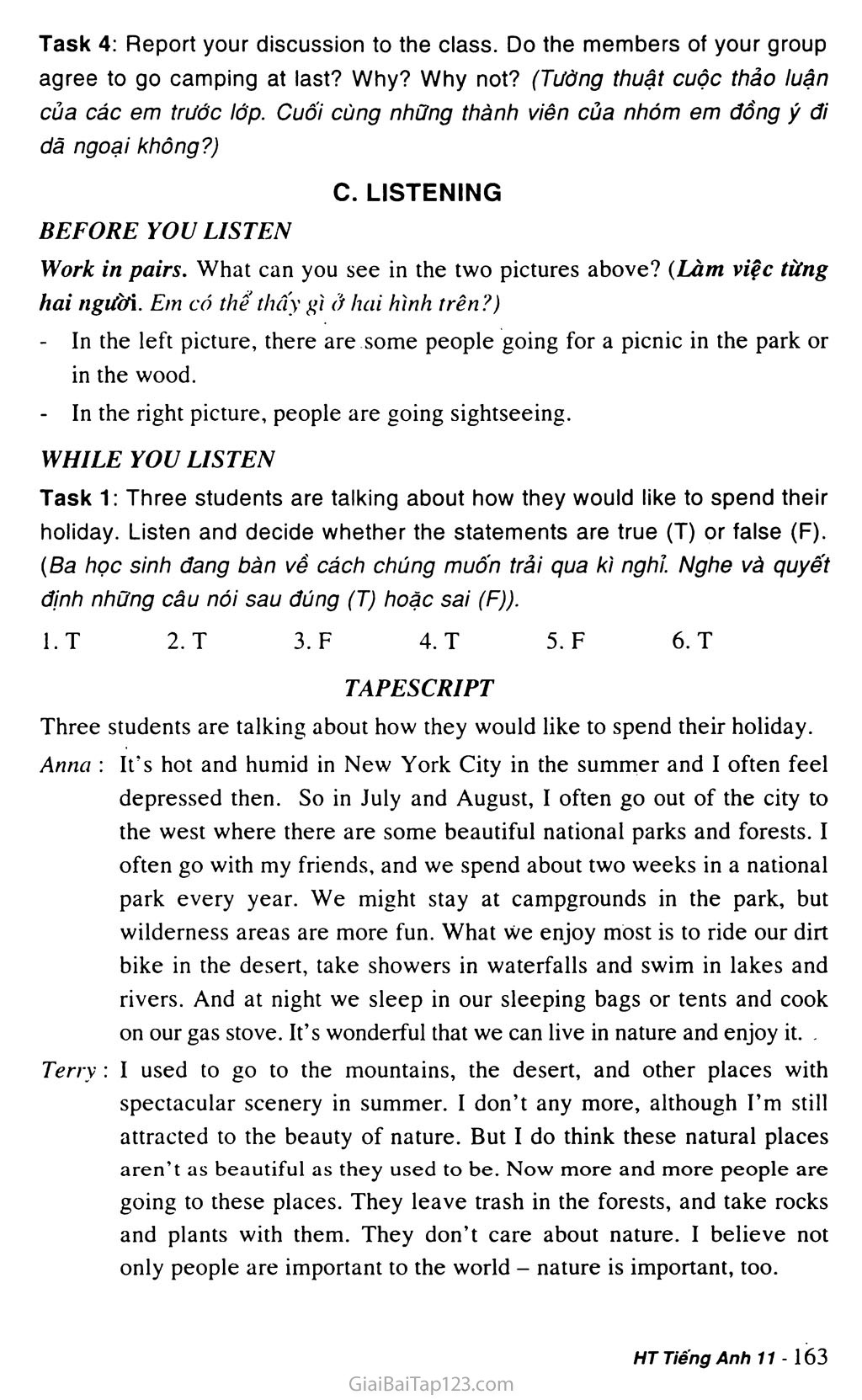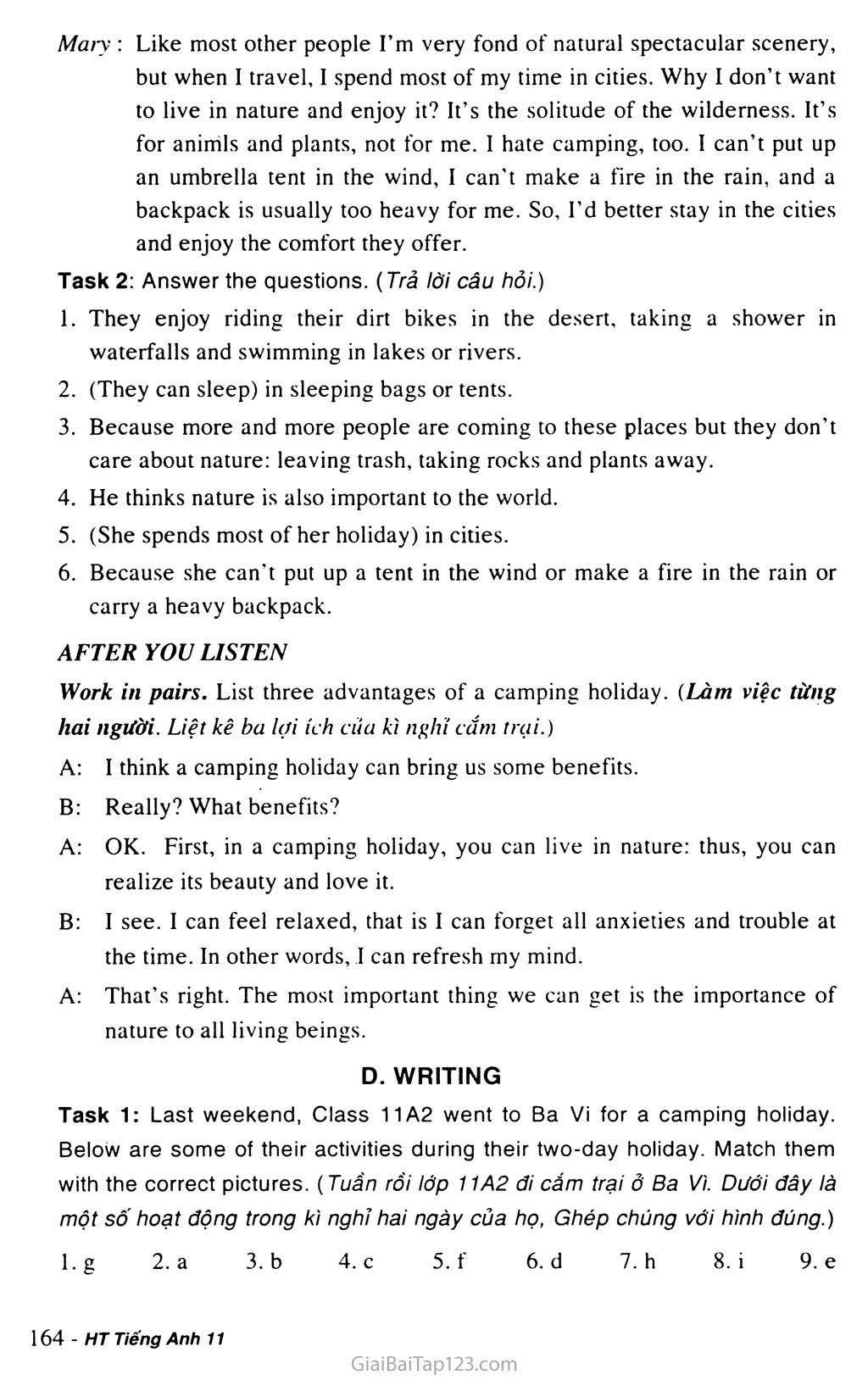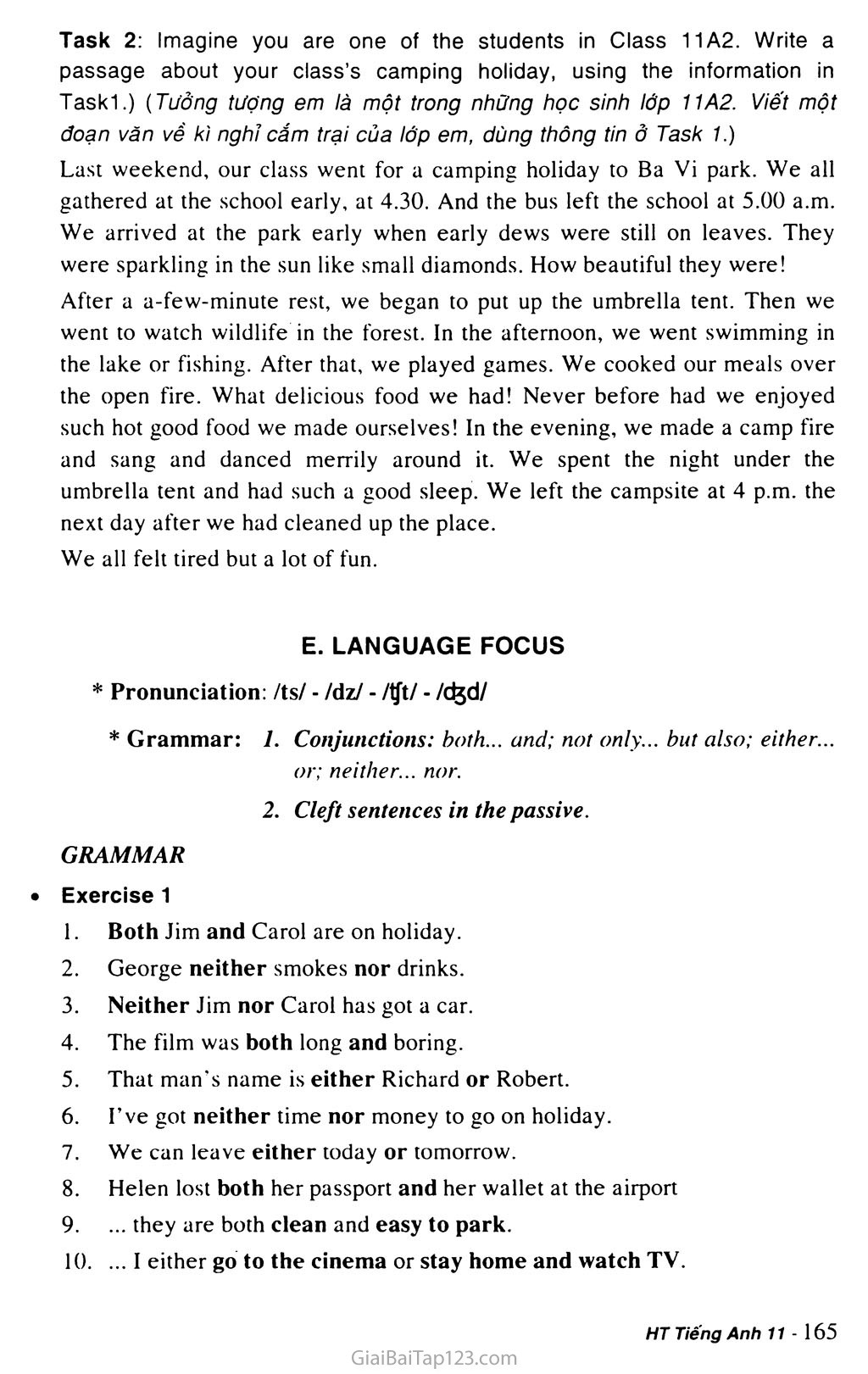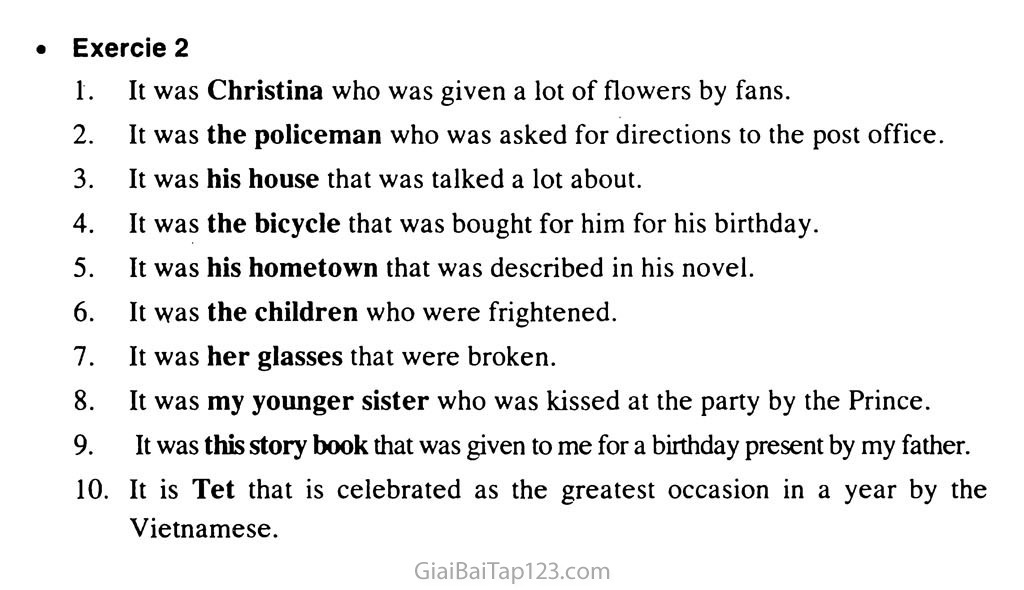Giải tiếng Anh lớp 11 Unit 14: RECREATION
43
RECREATION
(Sự giải trí)
VOCABULARY
spare time
[spea taim]
(n) : giờ rảnh rỗi
spare
[spea]
(adj): thừa, dư
by far
(adv) : số lượng nhiều, nhiều
household
[haushaold]
(n): hộ, gia đình
view
[vju:]
(v) : watch: xem
pursuit
[pa’sutt]
(n) : sự theo đuổi
include
[in’klu:d ]
(v) : bao hàm
inclusion
[in’kluijn ]
(n) : sự bao gồm
inclusive
[in’klu:siv]
(adj) : gồm cả, kể cả
spectator sports
[spek’teita spo:ts] (n) : môn thể thao xem
do-it-yourself*
(exp.): tự làm
gardening
['ga:daniq]
(n) : sự/việc làm vườn
undertake undertook
undertaken I Andateik Andatuk Andateikn ] (v): thực hiện
snooker
|‘snu:ka]
(n) :
môn snooker (một loại hình bi-da)
pool
[pu:l|
(n) :
môn pool (một loại hình bi-da)
dart
[da:t|
(n) :
phi tiêu; (sn): trò chơi phóng phi tiêu
enormous
[i’na:mas]
(adj):
nhiều, to lớn
on offer
|Dn Dial
(prep) : available: sẵn có
bricklaying
[ 'brikleiip ]
(n) :
xứ V dựng
sophisticated
[ sa’fistikeitid]
(adj)
: complex, complicated: phức tạp
stock market
[‘stDk ma:kit|
(n) :
thị trường chứng khoán
shoemaking
I 'Ju: meikiq]
(n) :
đóng giày
engrave
[in'greiv]
(V) :
khắc, chạm
practical skill
[ prasktikl skill
(n) :
kĩ năng thực hành
entry qualifications
[‘entri kwDlifikeiJnI (n)
: í7/ểw kiện nhập học
entry examination
[‘entri egzaemineijnI (nl
I : kì thi nhập học
generous
I‘d3enaras]
(adj)
: dễ dãi, rộng lượng
basement
I'beismant]
(n) :
tầng hầm
spectacular
[spek’taskjula]
(adj)
: very impressive and exciting: hùng vĩ, ngoạn mục
hire
[haiaj
(V)
employ: r/ỉí/ê, mướn
memento
[mi'mentau]
(n) :
ki vật
campground
fkaempgraundl
(n) :
bãi đất cắm trụi
trash
[trsej I
(n) :
rác
giant
I'dsaiant]
(adj)
: huge, gigantic: khổng lồ
giant tree
(n) :
cây cồ' thụ
dirt bike
[‘da:t baik]
(n) :
xe đụp dịu hình
depressed
[dl'prest I
(adj)
: chán non. thốt vọng
solitude
|'SDlitju:d]
(n) :
sự biệt lập/cô •độc
wilderness
[waildams]
(n) :
miền hoang dã
desert
I ldez3:t]
(n) :
sa mạc
umbrella tent
[Am'brela tent]
(n) :
lều dù
wallet
|‘wo:lit|
(n) :
cái ví (đựng tiền, giấy tờ. .)
II. GRAMMAR
A. Paired conjunctions (Liên từ cặp đôi): both... and, either... or, neither... nor, not only... but also...
Những liên từ cặp đôi này dùng cấu trúc song hành (parallel structure- parallelism). Từ/cụm từ hay mệnh đề được nôi liền bởi những liên từ này luôn có cùng câu trúc (construction), chức năng (function) hoặc từ loại (part of speech).
both... and (vừa... vừa ; cả... lẫn... )
e.g.: She's both intelligent and beautiful, (adjectives)
(Cô ây vừa thông minh vừa đẹp.)
Both his brother and he are students, (nouns)
(Cd ư/ỉ/ỉ của anh ấy lẫn anh ấy là sinh viên.)
Chú ý: Khi hai chủ từ được nối liền bởi both... and', động từ luôn ở số nhiều.
not only... but also (không những/chỉ... mà còn).
e.g.: Not only workers but also farmers take part in the strike.
(Không chỉ công nhân mà câ nông dân tham gia cuộc đình công.)
He studies not only Japanese but also Chinese.
(Anh ấy học không chí tiếng Nhật mà càn tiếng Trung quốc.)
Chú ý:
Khi hai chủ từ được nối bởi “not only... but also", động từ hòa hợp với chủ từ ngay trước nó.
Khi “Not only... but also” nối liền hai mệnh để và đứng đầu câu, chúng ta phải dùng phép đảo ngữ. (V + s...)
e.g.: Not only does he speak English but he also speaks German.
(Không chỉ anh ấy nói tiếng Anh mà còn nói tiếng Dức.)
e.g.: Not only his friend but also his brother gives him presents.
(Không chỉ các bạn của anh mà cả anh của anh cho anh quà.)
either... or: “hoặc... hoặc”
e.g..: Either you or your friend is responsible for the damage.
(Hoặc anh hoặc bạn anh chịu trách nhiệm sự hư hụi.)
You either must work hard or will fail.
(Bạn hoặc làm việc cần cù hoặc sẽ thất bại.)
“neither... nor”; (không... cũng không; cả... lẫn cũng không...” e.g.: She likes neither tea nor coffee.
Chị ấy không thích trà cũng không thích cù phê.)
Neither my parents nor my sister is here.
(Ca cha mẹ tôi lẫn chị tôi cũng không ở đây.)
Chú ý. Khi hai chủ từ được nối liền bởi “either... of' hoặc “neither... not1'-. động từ hòa hợp với chủ từ ngay trước nó. e.g.: Either you or he is going to be on duty.
(Hoặc bạn hoặc anh ấy sẽ trực ban.)
B. “Cleft ” SENTENCES in the passive (“Cầu chẻ ” ở thể bị động).
e.g.: People talk about this film. (Người ta nói về phim này.)
-* It’s this film that is talked about.
Columbus discovered America. (Columbus tìm ra châu Mĩ.)
“* It was America that was discovered by Columbus.
III. SOLUTIONS AND TRANSLATIONS (LỜI GIẢI VÀ BÀI DỊCH)
A. READING
BEFORE YOU READ
Work in pairs. Which of the following leisure activities do you think British people often do in their spare time? (Làm việc từng hai người. Em nghĩ hoạt động giải trí nào trong những hoạt động sau người Anh thường làm trong thời gian rảnh của họ?)
A: What leisure activities do you think British people do in their free time? B: I think they play a musical instrument.
A: I think they like watching sports. You know football originated in England. B: I was told British people now like singing, specially “Karaoke”.
A: But British like watching TV, too.
WHILE YOU READ
Read the passage and then do the tasks that follow. (Đọc đoạn văn và sau đó làm bài tập theo sau.)
Một câu nói của người Anh là, “Làm việc có giờ, chơi có lúc". Giải trí và vui chơi quan trọng cho con người ở bất kì nơi đâu trên thế giới. Tuy nhiên, hình thức của vui chơi phổ biến khác nhau ở các quốc gia khác nhau.
Ớ Anh, những hoạt động trong giờ rảnh thông thường nhát là ở nhà.
Xem truyền hình về số lượng là sự giải trí phổ biến nhất, và gần như tất cả gia đình có một truyền hình. Trên 51 phần trăm gia đình có hai truyền hình hoặc hơn nữa và giờ xem trung bình cho trẻ 4 tuổi hoặc hơn là 25 giờ một tuần. Những thú vui khác là nghe nhạc, đọc sách, công việc tự sửa sang nhà và làm vườn.
Người Anh cũng thích xem và tham gia thê thao. Đi bộ và bơi lội là hai hoạt động thể thao phổ biến nhất, được cả đàn ông và phụ nữ thực hiện như nhau. Các loại bi-đa, snooker, pool và phóng phi tiêu là những môn thể thao được ưa thích kế tiếp của đàn ông. Những môn thể thao xem phổ biến nhất là bóng đá và bóng bầu dục vào mùa đông, và cricket và điền kinh vào mùa hè.
Trong vài năm vừa qua ở Anh, một xu hướng mới đang phát triển, đó là theo học những khóa học cuối tuần hoặc hè. sẩn có một số lượng khóa học khổng lồ. Khóa học có thể đơn giản như xây dựng hoặc phức tạp như đưa ra quyết định ở thị trường chứng khoán. Đôi với người thích hội họa, có nhiều khóa về họa hoặc vẽ. Những người thích âm nhạc có thể theo khóa học về hát Karaoke. Các khóa học như đóng giày hoặc chạm trên kiếng cung câp người dân những kĩ năng thực hành họ có thể làm với đôi tay của mình. Những người muốn trau dồi trí tuệ có thể theo khóa “Sống có ý nghĩa hơn”. Điều kiện nhập học những khóa cuối tuần dễ dàng, thường thường không cần điều kiện gì hết, ngoài khả năng trả học phí có lẽ khá cao.
Task 1: The words/phrases in italicized in the following sentences all appear in the passage. Circle the best answer. {Tất cả những từ/cụm tù in nghiêng ở nhũng câu sau xuất hiện ở đoạn vãn. Khoanh tròn câu trả lời đúng.)
A 2. B 3. B 4. A 5. B 6. A
Task 2. Answer the questions. (Trá lời câu hỏi.)
Because without them people will become dull or bored.
They like watching football and rugby in winter and cricket and athletics in summer.
They like taking part in walking and swimming.
Because this is a new kind of entertainment which gives them pleasure. AFTER YOU READ
Work in pairs. Discuss the question: Which of the British leisure activities mentioned in the passage are also popular in Vietnam? Which are not? (Làm việc từng hai người. Thao luận câu hoi : Hoạt động nhàn rỗi nào trong các hoạt dộng của người Anh dược nói đến ở đoạn văn cũng phố biến ở Việt Nam? Hoạt dộng nào không?)
A: Do you think the British leisure activities are the same as those in Vietnam? B: Yes. I think so.
A: Which of them do the British and the Vietnamese both do?
B: They watch TV and listen to music.
A: Well, I see men in England and in Vietman are both interested in playing billards or snookers.
B: Which leisure activities do you think are not the same?
A: Well, the different activities are meeting friends, spending time outdoors or gardening.
B: And at present most British people spend their weekend time taking weekend or holiday courses in almost every subject.
B. SPEAKING
Expressing agreement and disagreement. (Diễn tả sự -dồng ý và không đồng ý.)
Task 1: The following are some phrases that can be used to express agreement or disagreemrent. Put (A) beside an expression of agreement and (D) beside an expression of disagreement. (Sau đây là một số cụm từ có thể được dùng diễn tả sự đồng ý hoặc không đồng ý. Viết (A) bên cạnh cụm từ đồng ý và (D) cụm từ không đồng ý.)
A 2. D 3. A 4. A 5. D 6. A 7. A
Task 2: The students of Class 11A2 will have a two-day holiday. They are discussing whether they should go on the camping holiday. Read and practise the conversation. (Học sinh lớp 11A2 sẽ có kì nghỉ 2 ngày. Chúng đang thảo luận liệu chúng nên di cám trại không. Đọc và thực hành bài đối thoại.)
A: Chúng ta đi cắm trại đi.
B: Vâng. Chúng ta hãy đi đi. Như thế chúng ta có thể nghỉ ngơi và vui thú ở miền quê yên tĩnh.
C: Ò! Tôi không nghĩ đó là ý kiến hay. Nếu chúng ta đi cắm trại, chúng ta sẽ phải mang theo nhiều đồ dùng cần thiết.
Task 3: Work in groups. Imagine you are the students of class 11A2. Continue the discussion. Express agreemrent or disagreemernt, using the reasons below. (Làm việc từng nhóm. Tưởng tượng các em là học sinh lớp 11A2. Tiếp tục cuộc thảo luận. Diễn tả sự đồng ý hoặc không đồng ý, dùng những lí do dưới đây.)
D: And we have to hire a coach, which will cost a lot of money.
A: But we can enjoy the trees, flowers and the wildlife.
B: Moreover, we can also enjoy spectacular scenery.
C: That’s a good idea, but we have to sleep in a tent, the weather might be bad. A: Yes, but we can get close to nature.
D: I don’t think it's a good idea. We’ll have to eat bread for two days, which is not pleasant at all.
A: OK. But don’t you think we can get more active?
C: Right, but let’s think it over!
Task 4: Report your discussion to the class. Do the members of your group agree to go camping at last? Why? Why not? (Tường thuật cuộc thảo luận của các em trước lớp. Cuối cùng những thành viên của nhóm em đồng ý đi dã ngoại không?)
c. LISTENING
BEFORE YOU LISTEN
Work in pairs. What can you see in the two pictures above? (Làm việc từng hai người. Em có thể thấy gì ở hai hình trên?)
In the left picture, there are some people going for a picnic in the park or in the wood.
In the right picture, people are going sightseeing.
WHILE YOU LISTEN
Task 1: Three students are talking about how they would like to spend their holiday. Listen and decide whether the statements are true (T) or false (F). (Sa học sinh đang bàn về cách chúng muốn trải qua kì nghỉ. Nghe và quyết định những câu nói sau đúng (T) hoặc sai (F)).
l.T 2. T 3. F 4. T 5. F 6. T
TAPESCRIPT
Three students are talking about how they would like to spend their holiday. Anna : It’s hot and humid in New York City in the summer and I often feel
depressed then. So in July and August, I often go out of the city to the west where there are some beautiful national parks and forests. I often go with my friends, and we spend about two weeks in a national park every year. We might stay at campgrounds in the park, but wilderness areas are more fun. What we enjoy most is to ride our dirt bike in the desert, take showers in waterfalls and swim in lakes and rivers. And at night we sleep in our sleeping bags or tents and cook on our gas stove. It’s wonderful that we can live in nature and enjoy it.
Terry : I used to go to the mountains, the desert, and other places with spectacular scenery in summer. I don’t any more, although I’m still attracted to the beauty of nature. But I do think these natural places aren't as beautiful as they used to be. Now more and more people are going to these places. They leave trash in the forests, and take rocks and plants with them. They don’t care about nature. I believe not only people are important to the world - nature is important, too.
Mary : Like most other people I’m very fond of natural spectacular scenery, but when I travel, 1 spend most of my time in cities. Why I don’t want to live in nature and enjoy it? It’s the solitude of the wilderness. It’s for animls and plants, not for me. I hate camping, too. I can’t put up an umbrella tent in the wind, I can't make a fire in the rain, and a backpack is usually too heavy for me. So, I’d better stay in the cities and enjoy the comfort they offer.
Task 2: Answer the questions. (Trả lời câu hỏi.)
They enjoy riding their dirt bikes in the desert, taking a shower in waterfalls and swimming in lakes or rivers.
(They can sleep) in sleeping bags or tents.
Because more and more people are coming to these places but they don’t care about nature: leaving trash, taking rocks and plants away.
He thinks nature is also important to the world.
(She spends most of her holiday) in cities.
Because she can't put up a tent in the wind or make a fire in the rain or carry a heavy backpack.
AFTER YOU LISTEN
Work in pairs. List three advantages of a camping holiday. (Làm việc từng hai người. Liệt kê ba lợi ích cửa kì nghỉ cắm trại.)
A: I think a camping holiday can bring US some benefits.
B: Really? What benefits?
A: OK. First, in a camping holiday, you can live in nature: thus, you can realize its beauty and love it.
B: I see. I can feel relaxed, that is I can forget all anxieties and trouble at the time. In other words, I can refresh my mind.
A: That’s right. The most important thing we can get is the importance of nature to all living beings.
D. WRITING
Task 1: Last weekend, Class 11A2 went to Ba Vi for a camping holiday. Below are some of their activities during their two-day holiday. Match them with the correct pictures. (Tuần rồi lớp 11A2 đi cẩm trại ở Ba Vì. DƯỚI đây là một số hoạt động trong kì nghỉ hai ngày của họ, Ghép chúng với hình đúng.) l.g 2. a 3. b 4. c 5. f 6. d 7. h 8. i 9. e
Task 2: Imagine you are one of the students in Class 11A2. Write a passage about your class’s camping holiday, using the information in Taskl.) (Tưởng tượng em là một trong những học sinh lớp 11A2. Viết một đoạn văn về kì nghỉ cắm trại của lớp em, dùng thông tin ở Task 1.)
Last weekend, our class went for a camping holiday to Ba Vi park. We all gathered at the school early, at 4.30. And the bus left the school at 5.00 a.m. We arrived at the park early when early dews were still on leaves. They were sparkling in the sun like small diamonds. How beautiful they were!
After a a-few-minute rest, we began to put up the umbrella tent. Then we went to watch wildlife in the forest. In the afternoon, we went swimming in the lake or fishing. After that, we played games. We cooked our meals over the open fire. What delicious food we had! Never before had we enjoyed such hot good food we made ourselves! In the evening, we made a camp fire and sang and danced merrily around it. We spent the night under the umbrella tent and had such a good sleep. We left the campsite at 4 p.m. the next day after we had cleaned up the place.
We all felt tired but a lot of fun.
E. LANGUAGE FOCUS
* Pronunciation: /ts/ - /dz/ - AỊí/ - /djd/
* Grammar: 1. Conjunctions: both... and; not only... but also; either... or; neither... nor.
Cleft sentences in the passive.
GRAMMAR • Exercise 1
Both Jim and Carol are on holiday.
George neither smokes nor drinks.
Neither Jim nor Carol has got a car.
The film was both long and boring.
That man's name is either Richard or Robert.
I’ve got neither time nor money to go on holiday.
We can leave either today or tomorrow.
Helen lost both her passport and her wallet at the airport
... they are both clean and easy to park.
... I either go to the cinema or stay home and watch TV.
• Exercie 2
It was Christina who was given a lot of flowers by fans.
It was the policeman who was asked for directions to the post office.
It was his house that was talked a lot about.
It was the bicycle that was bought for him for his birthday.
It was his hometown that was described in his novel.
It was the children who were frightened.
It was her glasses that were broken.
It was my younger sister who was kissed at the party by the Prince.
It was this story book that was given to me for a birthday present by my father.
It is Tet that is celebrated as the greatest occasion in a year by the Vietnamese.

